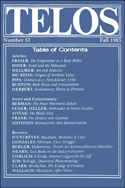As an occasional feature on TELOSscope, we highlight a past Telos article whose critical insights continue to illuminate our thinking and challenge our assumptions. Today, Matt Applegate looks at Arshi Pipa’s “Gramsci as a (Non) Literary Critic” from Telos 57 (Fall 1983).
 Arshi Pipa’s “Gramsci as a (Non) Literary Critic” is more than a short biography and description of Antonio Gramsci’s inquiries into literary criticism. It also provokes the reader to meditate on the political conditions of literary criticism as an intellectual practice. Gramsci is a controversial figure in the history of literary criticism for at least two reasons, according to Pipa. First, his political work remains more prominent than his literary criticism. When one thinks of Gramsci as a writer and historical figure, his literary criticism might not even register, given his political writing and influence. Second, Gramsci’s politics serve as the impetus for his intellectual projects, thus also providing potential grounds to dismiss or ignore his aesthetic analyses. To be sure, Gramsci is a controversial political figure. In 1921 Gramsci co-founded and led the Communist Party of Italy in opposition to fascism, and was later arrested by fascist police under Mussolini, ultimately dying in prison in 1937. Perhaps his most famous collection of writings, Prison Notebooks, was completed while he was incarcerated between 1926 and 1937. Yet, it is precisely Gramsci’s controversial style and political will that draw Pipa to his work and allow him to question literary criticism as an enduring intellectual practice.
Arshi Pipa’s “Gramsci as a (Non) Literary Critic” is more than a short biography and description of Antonio Gramsci’s inquiries into literary criticism. It also provokes the reader to meditate on the political conditions of literary criticism as an intellectual practice. Gramsci is a controversial figure in the history of literary criticism for at least two reasons, according to Pipa. First, his political work remains more prominent than his literary criticism. When one thinks of Gramsci as a writer and historical figure, his literary criticism might not even register, given his political writing and influence. Second, Gramsci’s politics serve as the impetus for his intellectual projects, thus also providing potential grounds to dismiss or ignore his aesthetic analyses. To be sure, Gramsci is a controversial political figure. In 1921 Gramsci co-founded and led the Communist Party of Italy in opposition to fascism, and was later arrested by fascist police under Mussolini, ultimately dying in prison in 1937. Perhaps his most famous collection of writings, Prison Notebooks, was completed while he was incarcerated between 1926 and 1937. Yet, it is precisely Gramsci’s controversial style and political will that draw Pipa to his work and allow him to question literary criticism as an enduring intellectual practice.







